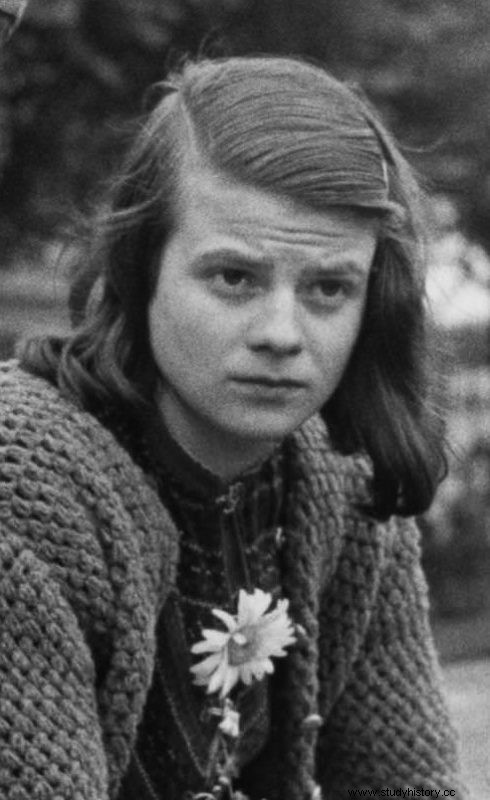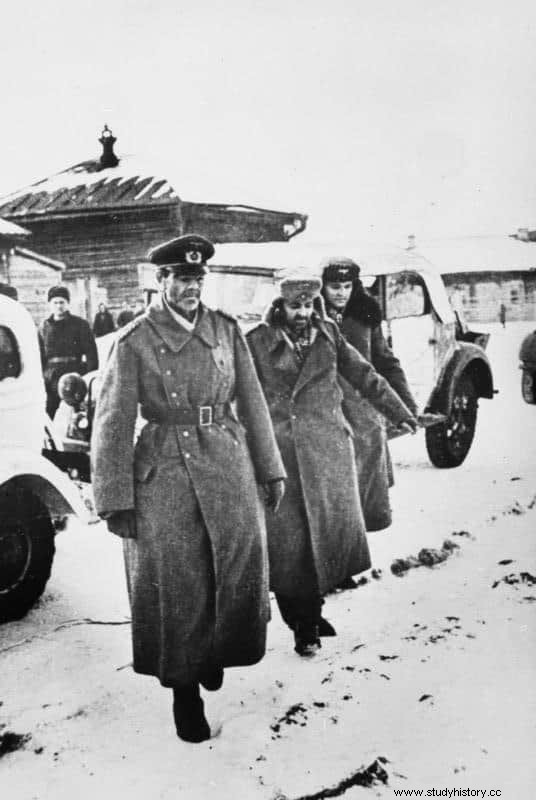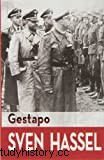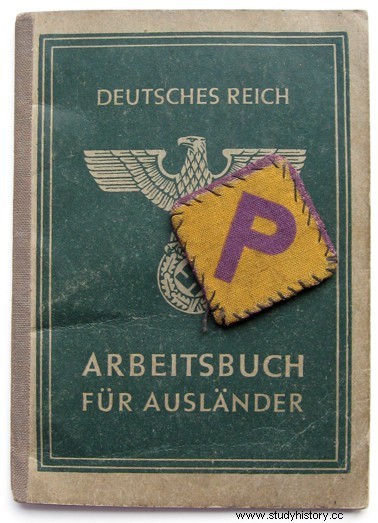1942. With the German army mobilized across Europe, Hitler's most powerful weapon of terror, the Gestapo, was working flat out crushing opposition and implementing the final solution of Nazi Germany. What had started as a national secret police force now had the power to kill or spare millions of people. As the Third Reich raced to its destruction and Hitler raged in his bunker, the Gestapo would reach new heights of disorder and brutality. But after the war, their officers would simply disappear and the greatest mystery of all remains, the fate of the Gestapo's creator, Heinrich Müller.
The White Rose
Since 1933 the Germans lived in fear of the Gestapo. But what they were to see in the years of Nazi Germany's decline would exceed their worst nightmares.
The Nazi movement had been born in Munich in the 1920s, but in early 1943 pamphlets began to appear around the University and the city in the name of a group calling themselves the White Rose . He spoke for the growing number of Germans disillusioned by the war and Hitler's handling of it.

The Gestapo reacted quickly and violently. The White Rose group were inexperienced dissidents, led by the young Scholl brothers. Not long after, the Gestapo had caught almost all the members of the group. In February 1943, after a brief show trial, the Scholls and other White Rose students were executed. The Gestapo had made a strong public statement, as they were facing something new, a huge current of opposition at home.
The war is going bad
Much of this was due to Germany's luck in the war, which was clearly being lost. The assault to the east had failed. The harsh Russian winter had taken its toll and the Wehrmacht had suffered huge losses. Nearly a million men had died, most of them at Stalingrad.

The withdrawal was inevitable. Many members of the Gestapose found themselves returning to the homeland. But it was not the confident Germany they had left behind, although the government still believed in the Nazi dream. Propaganda Minister Joseph Goebbels kept calling for total war. However, the data was not good for the Nazis, who refused to recognize reality based on their political worldview. The final victory impossible.
But the German people themselves were beginning to realize that the war was lost. There was an increase in anger and therefore the challenges for the Gestapo increased. Propaganda may have been telling the German people one thing, but at home they heard another.
Radio, the most effective medium for government propaganda, now became a threat to the Nazi leadership. Since radio waves know no borders. Listening to foreign broadcasts was not only illegal, but treasonous. The Gestapo took drastic measures. A complaint of listening to foreign radios meant immediate arrest.
The emphasis on extermination
The Gestapo did not neglect its other tasks to complete the plan of racial purity, the final solution . It was something that the head of the Gestapo, Müller, had taken care of personally. Instructions had been given at the Wannsee Conference, and Müller was proud to complete his commission. There were still a few full-blooded Jews left in Nazi Germany, but Müller was determined to get rid of them all.
There were complicated laws about Jewish blood and marriage. Until then, Jews married to Aryans had been somewhat protected from going to the camps, but that was no longer enough to keep the Gestapo away. With instructions from Müller, the Gestapo continued to fill the concentration camps with Jews who went unnoticed in the first deportations.
The propaganda posters made it very clear. The figure of a demonized and stereotyped Jew, sustaining both the Soviet Union and the United States in the form of international capital. He carried a whip with which he beat the Germans. It was a cruel turn of events, but it was the basic lie on which the Third Reich had been built.

For the Nazis it was vital that the final solution take precedence even over military operations, since the Jews were considered the ultimate enemy. This happened very often. The most striking and easily traceable cases are those of the reinforcement trains for the front stopped for hours or days to give priority to transporting Jews to the extermination camps.
Population control tightens
But Müller's zeal was bound to be repaid, since the war was soon to require the unconditional attention of the Gestapo. In 1944 propaganda went a step further. Without more support at home, victory was impossible. The Germans who were in the country were asked for help. Rationing tightened.
But it wasn't that easy. As the population increasingly disagreed with the Nazi regime, words were not enough. The Gestapo began by approaching all those who obviously did not aspire to the Nazi prototype, those who had not joined the Volksgemeinchaft .Anyone who rejected this ideal was automatically suspect.
Anyone who imitated the enemy's lifestyle was quickly targeted by the Gestapo as a traitor. Young fans of jazz or swing were some of those persecuted by the Gestapo. The propaganda machine was in overdrive, systematically denigrating Americans and blacks in particular. The German Swing boys were just boys who wanted to rebel. Swing was cosmopolitan and relaxed, everything the Nazis rejected. But they were accused of weakening the country, of betraying the brave soldiers at the front.
rebates The Gestapo:Myth and Reality of Hitler's Secret Police (Critical Memory) McDonough, Frank (Author) 21 €.75
The Gestapo:Myth and Reality of Hitler's Secret Police (Critical Memory) McDonough, Frank (Author) 21 €.75  Gestapo Hassel, Sven (Author) 9.95 EUR
Gestapo Hassel, Sven (Author) 9.95 EUR  Heydrich (20th century history) Gerwarth, Robert (Author) 9.02 EUR
Heydrich (20th century history) Gerwarth, Robert (Author) 9.02 EUR  Operation Anthropoid [DVD] Jamie Dornan, Cillian Murphy, Toby Jones (Actors); Sean Ellis (Director) €14.00
Operation Anthropoid [DVD] Jamie Dornan, Cillian Murphy, Toby Jones (Actors); Sean Ellis (Director) €14.00 It was the Gestapo that caught the swing boys in their net. The Gestapo carried out arrests all over Germany to finish them off. Being nothing more than kids who just wanted to be a little rebellious and there was no organization behind it, the movement was quickly stopped.
Although support among ordinary Germans was not what it had been, the Gestapo still relied heavily on its informants. The index cards that were so religiously kept in each office contained all the complaints and recorded the measures taken in this regard. Any German citizen could now be a victim of the Gestapo.
The Nazi War Effort
The Nazi bid for the conquest of Europe had seen all capable men drawn into the armed forces of Nazi Germany. At home, the labor shortage was severe. Vital industries, the ammunition factories, were in chaos. The allies solved this problem by putting their women to work, but the Nazi mentality that a woman's place was at home made that impossible in Germany.
To solve the problem, millions of men from the occupied territories were sent to German factories. At first the workers were volunteers. But there were too few to keep the gigantic German war machine going. So the authorities opted for forced labor and began importing workers from the occupied territories. In the end, almost 7 million people.
The Gestapos were given the task of choosing the candidates for this involuntary journey, one of the largest forced migrations the world has ever seen.
Although absolutely necessary for the German war, these foreign workers were not treated well. The workers coming from the countries of the East lived in workers' camps in a semi-freedom regime. They were marked with a cartouche where it said Ost, this in german. The Poles wore a second cartouche with the letter P. They worked six days a week for land that corresponded to a quarter of the normal salary. During their day off they were forbidden to run German premises or take public transport.

For the Gestapo, this alienated workforce posed a huge security problem. His solution was predictable. In the absence of a real intelligence service, they gave exemplary and ruthless punishments to anyone who caught their attention.
Last updated on 06-09-2022 / Affiliate Links / Affiliate API Images
